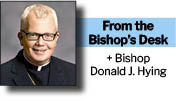
Reinhold Niebuhr (1892-1971), an influential Protestant theologian in the United States, greatly impacted how we think about the relationship of religion and culture.
He wrote and spoke frequently about the intersection of religion, politics, and public policy.
In regards to religious faith and practice, he sought to avoid both a utopian idealism and a too-narrow understanding of the divide between theology and the public square.
Known as the author of the Serenity Prayer, he is also famous for his reflections on the differing modes of how Christ and culture relate.
In Niebuhr’s view, Christian believers relate to the world around them in one of three fundamental ways.
He defined these modes of both thought and action in the following fashion: Christ against culture; Christ transforming culture; Christ equivalent to culture.
Let’s explore these because they can help us understand how Catholicism has consistently viewed her role in the world and how the Lord is calling us in this critical moment to speak and act.
‘Christ against culture’
Christians who embrace a mode of “Christ against culture” clearly view the world as hostile to religion and therefore create an alternative community and practice which protect them from the errors and evil of the society at large.
They see little or no need to engage those outside their group or to contribute to the service of the common good.
The world is a wicked and hostile place that must be avoided in order to remain faithful and steadfast to Christ and the Gospel.
Such Christians would draw a very bright and definite line between their religious faith, interpretation of the Bible, and spiritual practice, and everybody else who does not subscribe to their views.
Examples of “Christ against culture” include many small sects and religious movements which hold themselves apart from the world.
‘Christ equivalent to culture’
“Christ equivalent to culture” expresses an opposite way of thinking. Christians who embrace this mode seek to adapt their faith and practice to the culture, thinking that the Church must change with the times in order to stay relevant and applicable to contemporary society.
In this view, theology and tradition are very fluid and malleable, general guidelines for belief and practice, but without many creedal and ethical absolutes.
Sin and the need for salvation find little space here.
“Christ equivalent to culture” will always view itself as evolutionary and ever-changing.
As religious and moral norms in the broader society continue to shift, so the Church must seek to keep pace.
Examples of this mode include many strands of liberal Protestantism and those non-denominational churches which take almost no definitive stand on any controversial issue of creed or morality, for fear of losing members.
‘Christ transforming culture’
Believers who embrace “Christ transforming culture” would subscribe to the view that Christians are in the world, but not of it.
In this view, the Church has a clear, fixed, and absolute creed and moral system which forms the worldview of believers.
This clarity of faith gives them the confidence to engage and evangelize others; to serve as salt, light, and leaven in the world around them; and to transform the institutions, individuals, and structures which form their experience and culture with the purifying light of Christ and the Gospel.
From the very beginning of her existence, the Catholic Church has always seen herself in this latter category, taking Christ’s Great Commission to heart, going into the world to proclaim the Gospel, and make disciples. Catholics do not reject the world nor do we surrender to the vagaries of the present culture.
We do not hide from the world nor do we seek to colorlessly fit into it.
The Church exists in time and space in order to bring all of humanity to salvation through faith in Jesus Christ, expressed and realized in the extension of the Gospel, the celebration of the sacraments, and the charitable service of our brothers and sisters.
This fundamental stance presupposes a truly pastoral fusion of revealed truth and heroic love.
Only those who embrace “Christ transforming culture” can truly evangelize.
Those who hide from the world have no real desire to engage others and those who adapt to the culture see no need to transform those around them.
This truth is important for us to understand in light of Go Make Disciples and Into the Deep.
One can only understand the rationale for both of these local, diocesan initiatives by embracing the “Christ transforming culture” mode of religious practice.
In next week’s column, I hope to explicate further Niebuhr’s thoughts in reference to how contemporary Catholics view and embrace the Second Vatican Council, and what that means for us right now.

